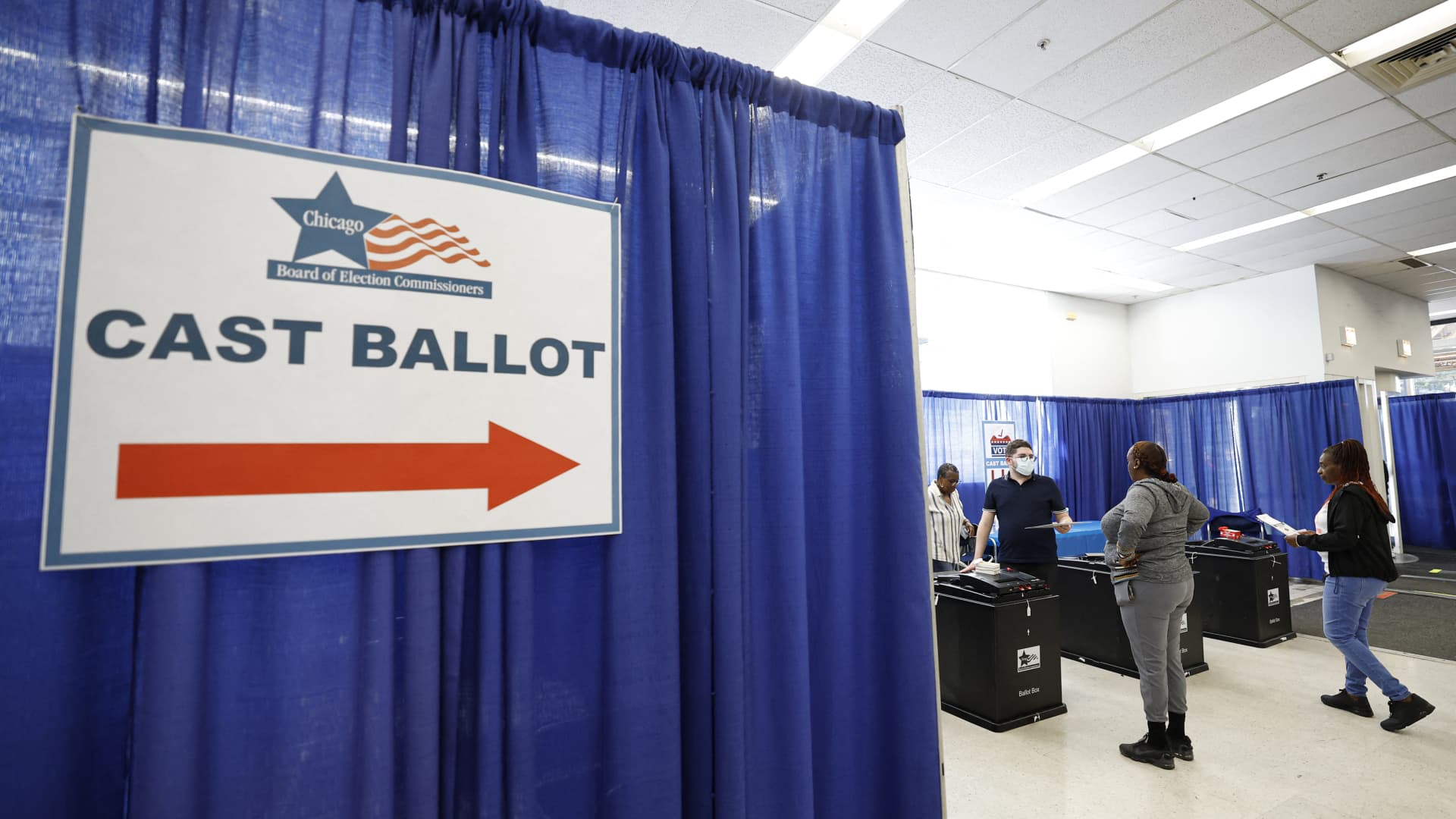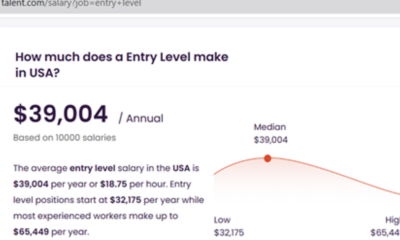Voters cast their ballots on the second day of early voting in the 2024 presidential election at the Board of Elections Loop Super Site in Chicago, Illinois, on October 4, 2024.
Kamil Krzaczynski | AFP | Getty Images
There are few topics Americans would rather not talk about more than money.
They would even rather reveal who they’re voting for in the November presidential election than talk about their finances, according to new research from U.S. Bank based on a survey of 3,500 individuals.
That’s on top of separate research that found personal finances are almost as difficult to talk about as sex, a recent Wells Fargo national survey including 3,403 adults found.
Most people are reluctant to talk about money, according to Wells Fargo’s research, and revealing how much they have saved or how much they have earned are two topics they’d prefer to avoid.
Still, for most people to be willing to talk about the U.S. election over their personal finances is a “big surprise,” said Scott Ford, president of wealth management at U.S. Bank.
People are likely more hesitant to talk about money because it is wrapped up with their anxieties, worries and aspirations, said Preston Cherry, a certified financial planner, founder and president of Concurrent Financial Planning in Green Bay, Wisconsin.
Moreover, while money is a “deeply personal,” everyday relationship, presidential elections are just once every four years, said Cherry, who is also a member of the CNBC FA Council.
Despite their reluctance, the research from U.S. Bank shows families are increasingly breaking the ice on financial topics, particularly with regard to conversations parents are having with their kids.
“The good news is people are talking more [about money], but it’s still at the surface,” Ford said.
U.S. Bank’s survey included 1,000 respondents from the general population, 1,000 mass affluent respondents with at least $250,000 in investable assets excluding their primary homes and retirement accounts, and 500 high-net-worth individuals with at least $1 million in assets excluding their primary homes and retirement accounts.
‘Missed opportunities’ of not talking about money
For both couples and families, not having those crucial financial conversations can cost them, financial advisors say.
“When you don’t have the knowledge, or you don’t feel like you have the ability to talk to your loved ones and people around you about money, then you also can’t build wealth effectively,” said Winnie Sun, co-founder and managing director of Irvine, California-based Sun Group Wealth Partners. She is a member of the CNBC FA Council.
“Avoiding money conversations will lead to misunderstandings, financial misalignment and, overall, just missed opportunities to plan effectively for the future,” said Douglas Boneparth, president and founder of Bone Fide Wealth, a wealth management firm based in New York City. He is also a member of the CNBC FA Council.
Have talks ‘before an emergency situation arises’
On a positive note, some money conversations are happening more regularly, U.S. Bank’s research found.
Today’s parents are almost twice as likely to discuss financial concepts with their children — such as investing in stocks and bonds — than their parents did with them, according to the firm.
Still, 45% of respondents say they are unaware of their parents’ financial situation, U.S. Bank found. Many believe they will have to provide financial help to their parents or in-laws in the future, according to the research.
A lack of family financial discussions can become an issue if aging relatives have a health scare, said Ford, who recalled having to scramble to pay the property taxes for a loved one who fell ill, without even knowing where the checkbook was.
“What I tell everyone is you want to have those conversations before an emergency situation arises,” Ford said.
To start to better understand older family members’ financial situations, it may help to begin with everyday items, like the cost of prescription medications, and build from there, Ford said.
“Our advice is just to start to have the conversation, start small,” Ford said.
More from Personal Finance:
How to frame financial decision making amid election uncertainty
Social Security’s death benefit has been $255 since 1954. How that may change
IRS free tax filing will be available in 24 states for the 2025 season
If those conversations are avoided, it can prevent important estate planning, health-care decisions and intergenerational wealth transfer, according to Boneparth.
“When these things aren’t accounted for, there could be costly legal mistakes or tax inefficiencies, either presently or down the road,” Boneparth said.
Ultimately, families want to have a full emergency plan in place, complete with knowledge of bank account information, long-term health-care plans, a will and a durable power of attorney, which is a legal document that gives someone else the authority to make financial or medical decisions on someone else’s behalf.
It may take some prodding for older family members to open up about their finances, said Ted Jenkin, a certified financial planner and the CEO and founder of oXYGen Financial, a financial advisory and wealth management firm based in Atlanta. He is also a member of the CNBC FA Council.
“It’s always best to approach parents and say, ‘Listen, we could care less how much money you have. We just want to make sure the proper things are in place to make sure that we’re not dealing with tons of legal hassles down the road,'” Jenkin said.
Couples often don’t agree on money
A lack of communication among couples can also lead to financial problems.
More than one-third of Americans don’t agree with their partners when it comes to how to best manage their money, both when planning for their current circumstances and retirement, according to U.S. Bank.
At the same time, 30% say they have lied to their partner about money, the firm found. Other research has shown that dishonesty — often referred to as financial infidelity — can be common when couples aren’t on the same page financially.
“Couples sometimes struggle,” Cherry said. “They struggle with sharing each other’s perspective without judgment in order to reach a common goal.”
To work past financial standoffs, it helps for couples to create a more welcoming environment to engage their partners in money conversations, Cherry said.
Financial advisors can often serve as mediators and objective third parties in those conversations, Ford said.
More than half — 53% — of investors surveyed who have at least $250,000 in assets said their financial advisor has helped them work through uncomfortable family money conversations, U.S. Bank found.
Many people may be hesitant to consult a financial professional if they don’t feel they have enough money or know the questions they should ask.
But taking that first step — whether it’s talking to an advisor or doing the research to educate yourself about personal finance — can help shift your mindset and reduce financial stress, according to Sun.
“Most financial advisors, especially the good, experienced ones, will give you a free first initial consultation,” Sun said. “That is super powerful, and you should take us up on it.”


 Accounting7 days ago
Accounting7 days ago
 Accounting1 week ago
Accounting1 week ago
 Accounting1 week ago
Accounting1 week ago
 Economics7 days ago
Economics7 days ago
 Economics5 days ago
Economics5 days ago
 Personal Finance1 week ago
Personal Finance1 week ago
 Personal Finance1 week ago
Personal Finance1 week ago
 Economics7 days ago
Economics7 days ago












